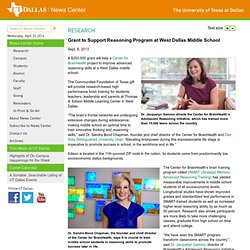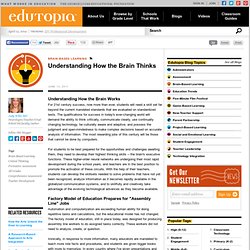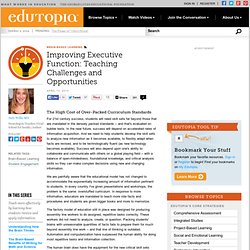

The 5 Best Free Mind-Mapping Tools for Teachers. Grant to Support Reasoning Program at West Dallas Middle School - News Center. Sept. 6, 2013 Dr.

Jacquelyn Gamino directs the Center for BrainHealth’s Adolescent Reasoning Initiative, which has trained more than 15,000 teens across the country. A $250,000 grant will help a Center for BrainHealth project to improve advanced reasoning skills at a West Dallas middle school. The Communities Foundation of Texas gift will provide research-based high performance brain training for students, teachers, leadership and parents at Thomas A. Edison Middle Learning Center in West Dallas. “The brain’s frontal networks are undergoing extensive changes during adolescence, making middle school an optimal time to train innovative thinking and reasoning skills,” said Dr.
Edison is located in the 11th-poorest ZIP code in the nation. Dr. The Center for BrainHealth’s brain training program called SMART (Strategic Memory Advanced Reasoning Training) has yielded measurable improvements in middle school students of all socioeconomic levels. Understanding How the Brain Thinks (Part 1 of 7) Understanding How the Brain Works For 21st century success, now more than ever, students will need a skill set far beyond the current mandated standards that are evaluated on standardized tests.

The qualifications for success in today's ever-changing world will demand the ability to think critically, communicate clearly, use continually changing technology, be culturally aware and adaptive, and possess the judgment and open-mindedness to make complex decisions based on accurate analysis of information. The most rewarding jobs of this century will be those that cannot be done by computers. For students to be best prepared for the opportunities and challenges awaiting them, they need to develop their highest thinking skills -- the brain's executive functions. These higher-order neural networks are undergoing their most rapid development during the school years, and teachers are in the best position to promote the activation of these circuits. The High Costs of Maintaining the Factory Model. Edutopia6tipsbrainbasedlearningguide. Improving Executive Function: Teaching Challenges and Opportunities (Part 3 of 7)
The High Cost of Over-Packed Curriculum Standards For 21st century success, students will need skill sets far beyond those that are mandated in the densely packed standards -- and that's evaluated on bubble tests.

In the near future, success will depend on accelerated rates of information acquisition. And we need to help students develop the skill sets to analyze new information as it becomes available, to flexibly adapt when facts are revised, and to be technologically fluent (as new technology becomes available). Success will also depend upon one's ability to collaborate and communicate with others on a global playing field -- with a balance of open-mindedness, foundational knowledge, and critical analysis skills so they can make complex decisions using new and changing information.
We are painfully aware that the educational model has not changed to accommodate the exponentially increasing amount of information pertinent to students. 7 Skills To Become Super Smart. People aren’t born smart. They become smart. And to become smart you need a well-defined set of skills. Here are some tips and resources for acquiring those skills. Memory If you can’t remember what you’re trying to learn, you’re not really learning.
If you want to amaze your friends with remembering faces, names, and numbers, look to the grand-daddy of memory training, Harry Lorayne. Reading Good scholars need to be good readers. Evelyn Woodski Slow Reading Course Announcer … Dan Aykroyd Man … Garrett Morris Woman … Jane Curtin Surgeon … Bill Murray … Ray Charles Announcer V/O: [The following words rapidly appear on a blue screen as they are read by the fast-talking announcer:] This is the way you were taught to read, averaging hundreds or thousands of words per minute.
Psychologists have found that many people who take speed reading courses increase their reading speed for a short time but then fall right back to the plodding pace where they started. Writing Speaking Numeracy Empathy. Taxonomy.